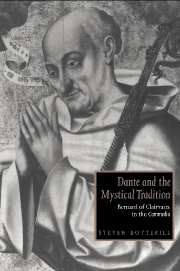Book contents
- Frontmatter
- Contents
- Acknowledgements
- 1 (Re-)reading Dante: an unscientific preface
- PART I READING
- PART II RE-READING
- 4 Bernard in the Trecento commentaries on the Commedia
- 5 Dante, Bernard, and the Virgin Mary
- 6 From deificari to trasumanar? Dante's Paradiso and Bernard's De diligendo Deo
- 7 Eloquence – and its limits
- Bibliography
- Index
- CAMBRIDGE STUDIES IN MEDIEVAL LITERATURE
6 - From deificari to trasumanar? Dante's Paradiso and Bernard's De diligendo Deo
Published online by Cambridge University Press: 15 January 2010
- Frontmatter
- Contents
- Acknowledgements
- 1 (Re-)reading Dante: an unscientific preface
- PART I READING
- PART II RE-READING
- 4 Bernard in the Trecento commentaries on the Commedia
- 5 Dante, Bernard, and the Virgin Mary
- 6 From deificari to trasumanar? Dante's Paradiso and Bernard's De diligendo Deo
- 7 Eloquence – and its limits
- Bibliography
- Index
- CAMBRIDGE STUDIES IN MEDIEVAL LITERATURE
Summary
Rosetta Migliorini Fissi's brief general introduction to Dante's life and works, published in 1979, is outstanding among the many books of its ilk for its combination of substance and concision; and not least among its claims to be better known is its original and fascinating interpretation of Paradiso. From the outset, Migliorini Fissi founds her analysis of the third cantica on the relationship between Dante's text and the work of Bernard of Clairvaux, which, going beyond the many scholars who have looked for traces of Bernard's presumed influence only in Paradiso XXXI–XXXIII, she finds exemplified as early as canto I. For her, the key to understanding Dante-character's experiences in Paradise is the ‘pregnante neologismo’ trasumanar (Par., I. 70), which she identifies as the ‘autentico correlativo poetico’ of one of the basic concepts of Bernard's mystical theology, deificatio (deification).
Returning, in a later article, to the same topic, Migliorini Fissi has also argued that closer attention to Bernard's mystical doctrine among Dantists is called for, in order to redress the balance of a critical history that has tended to see the Bernard–Dante relationship largely in terms of the Mariological question. Her work, then, must be taken into account in the present study, since it constitutes the first thorough-going attempt to develop the perception of Bernard's importance to Dante as a contemplative (which is guaranteed by the text of the Commedia – Par., XXXI. 109–11; XXXII. I) into a theory of his crucially formative significance for the whole theological – and, eventually, mystical – apparatus of Paradiso.
- Type
- Chapter
- Information
- Dante and the Mystical TraditionBernard of Clairvaux in the Commedia, pp. 194 - 241Publisher: Cambridge University PressPrint publication year: 1994



